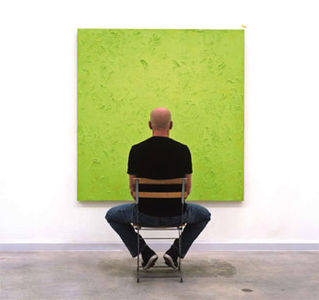Learning patterns/Use Wikimedia content to assist teaching Wikipedia
Appearance
A learning pattern foreducation
Use Wikimedia content to assist teaching Wikipedia
problemSometimes what we are trying to teach does not get the attention it should to have a result.
solutionUse online content like pieces of art, diagrams etc. in Commons. Multimedia might help teaching a lot.
creator• ManosHacker
created on23 August, 2016
What problem does this solve?
[edit]We are not always in position to make people understand and give focus to what we are trying to tell them during our Wikipedia teaching courses, so that they remember when needed. Logic statements people just agree with, do not produce strong memories for sure.
What is the solution?
[edit]Teach important issues by optical examples and discussions.
-
Bullying:
Let the participants spot details in the painting ("Newcomer at school"). Then set a rule that 3 details make an argument. Let them build a story by arguments. Do not push your opinion, just remind the rule. In the end ask rhetorically what they would do if they witnessed such a situation in Wikipedia. -
Self control:
Study amygdala hijack and explain the neuronic circuit of fear in the sudden view of a "snake" or a snake. Then turn the circuit between amygdala and frontal lobe (thoughts, imagination) instead of between amygdala and optical lobe, to explain anger. Testify that an untrained anger circuit does not permit a clear reading of a text in front of our eyes for a few days, in a Wikipedia talk page. In a following lesson, use the anger circuit to analyze timing in Paradise and Hell story. -
Help keeping of control:
When the elephant is in pain/hurt or scared/upset- the mahoot could loose control. The elephant takes over, training goes out the window and it reacts on pure instinct. What could the mahoot do?
Jokes, sarcasm, excuses, gossip, rage quit, strike, disruption can be reactions of people who are not in control of a situation.
Create an atmosphere where it is safe to disagree. Make disagreement safe, try to also treat disruptive feedback as feedback, agree with what you can, give agency, mirror opinions - literally repeat the words of the other (best way to make people feel heard, relax the elephant)
Build consensus around majority - but there is always a minority, those elephants can get upset. Appreciate their point of view even if you won the argument, where they are coming from, that the discussion was frustrating for them. Seems trivial but it is not. Is there a little something that we can do /change about the current situation that makes it a little more acceptable for you. Just asking them already can make them feel better and helps them save their face.
Use humor to heal, not to harm.
Shut our complete bad faith or total trolling - it's the opposite of civil argument. There need to be boundaries and people who are absolutely not willing to accept them, you need to speak up and shut them out. Especially if it is NOT your discussion. Don't stay silent. Show up, don't just be a silent witness. Especially if it is not your conflict.
Passive toleration of trolling by decent people is a huge problem throughout internet communities, because that means, that the community de facto tolerate non-civil behaviour. -
white article:
Can an article be truly neutral?
An article can be a mirror of our thoughts and deep or current emotions. Analyzing "Newcomer at school" drawing is a nice example of how each one percieves differently what the girl on the far right is doing and why. A white painting, having nothing to say by itself, reflects ourselves to us. An article should be as clean as white (no article at all?) to be completely neutral. Perfect neutrality is achieved when both a supporter and an opposer of Hitler see his article as white, reflecting back their opinion perfectly. -
white articles
In many situations it is a lot difficult to have a "white article"
Things to consider
[edit]Most things can be interpreted in many ways. Stay focused on learning goal and time available.
When to use
[edit]During courses, workshops, lectures etc.
See also
[edit]Related patterns
[edit]External links
[edit]References
[edit]- Grants:Learning patterns/Consolidate Wikipedia and Education using UNESCO's principles for education
- Grants:PEG/Manos Kefalas/Wikipedia School in Athens, Greece/Report
Endorsements
[edit]- Friendlyness opens a billion doors Lotje (talk) 08:16, 17 January 2018 (UTC)






